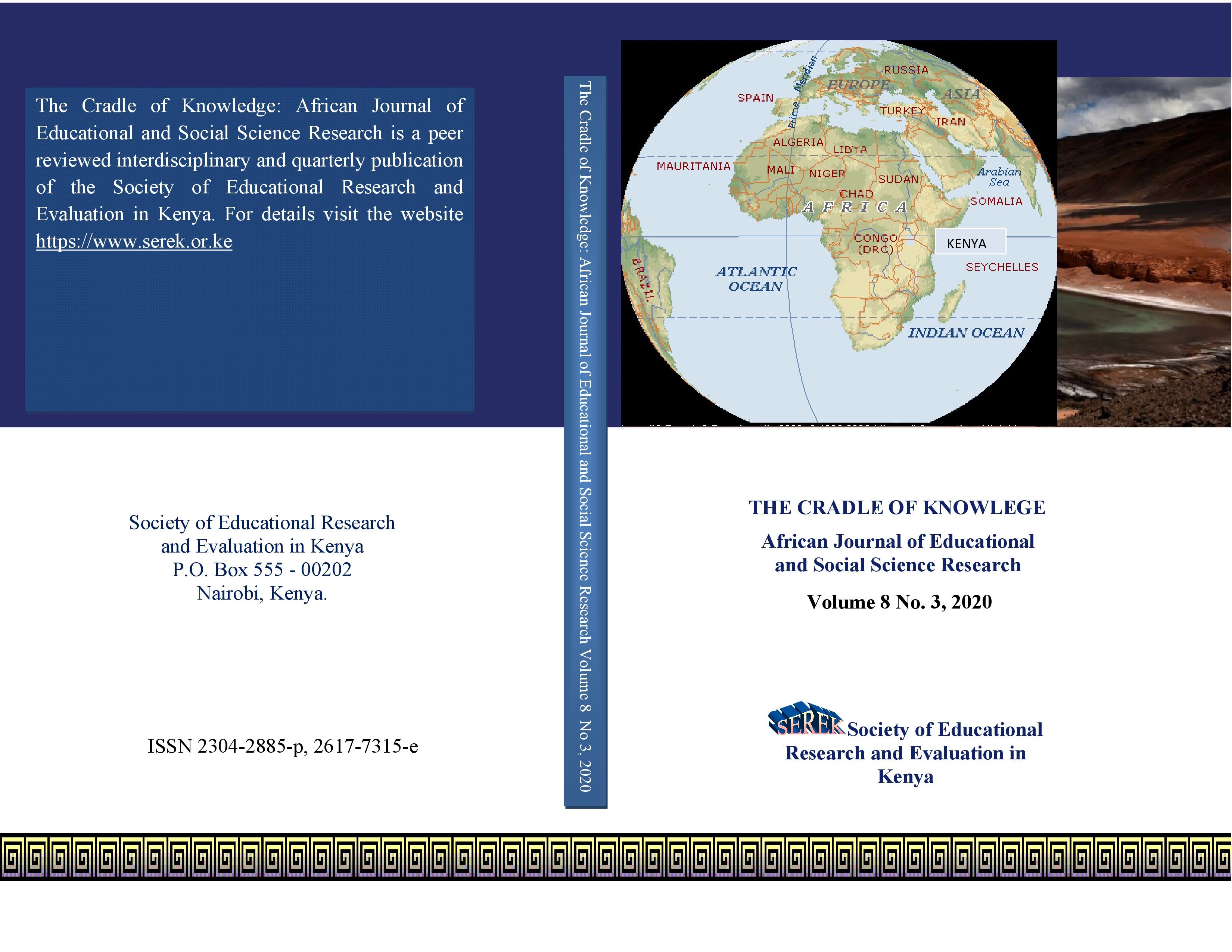
Access to Higher Education in Tanzania: Experiences from Students Who Are Not Beneficiaries of Higher Education Loans
Abstract
The aim of this study was to explore the experiences of students who do not benefit from higher education loans in their education. Although the government declared free education for primary and ordinary secondary education, yet the majority of the students who complete secondary education find it difficult to access higher education. The government through her scheme of loans has supported some students through Higher Education Students’ Loans Board (HESLB). This Board has the objective of assisting needy and eligible Tanzania students to access loans and grants for higher education. Because of tough eligibility criteria, there are many students who secure chance for Higher Education, and yet they are not qualified for loans. Some of these students get to the university with the support of their parents or guardians. This study was particularly geared to explore their experiences in the university life and to compare their performance with those who are the beneficiaries of the loans. This study used parallel concurrent triangulation design, targeting university students and university loan officers. The findings indicate that students who are not beneficiaries of the loans experience various challenges such as failure to register as students, social isolation, stress, stigma, prostitution, pregnancy and others. The findings also indicate that students who are the beneficiaries of loans perform better than none beneficiaries of the loans. This study suggests that the government should find ways to allocate more funds for students who qualify to access higher education and find other ways of supporting students who qualify for higher education.
Key words: Access to Education, Higher Education Students’ Loans, Life Experience, Performance
Full Text:
PDFReferences
Albert Zephaniah Memba1 & Zhao Zun Feng, (2016). Performance of the Higher Education
Students Loans Board in Human Capital Investment from 2005-2015. Higher Education Studies; Vol. 6, No. 3; Canadian Center of Science and Education 48.
Altbach, P. G., & Knight, J. (2007). The internationalization of higher education: Motivations
and realities. Journal of Studies in International Education, 11, 290. http://dx.doi.org/10.1177/1028315307303542
Al-hajry, A. S. (2002). Human Capital Theory and Financing of Higher Education in Oman (A
Doctoral Thesis). Department of Economics, University of Sheffield, UK. Retrieved from http://www.etheses.whiterose.ac.uk/3433/
Creswell, J. W. & Clark, V. P. (2007).Designing and Doing Mixed Method Research. London:
Sage Publications.
Hidayah & Sarah, (2018). Causes of Absenteeism among University Students. Available from:
https://www.researchgate.net/publication/333843370_Causes_of_Absenteeism_among_University_Students [accessed Jan 29 2020].
Itai Mafa & S.M. Kang’ethe (2017).Exploring the Underpinnings of Pseudo-prostitution in
Institutions of Higher Learning in Selected African Countries: A Literature Review. Journal of Sociology and Social Anthropology Volume 7, 2016 - Issue 3.
Janet M. Wilbert and Mahmoud Haddad, (2014). Student Loan Debt: How Are The Funds
Spent?. Journal of Academic Administration in Higher Education.vol. 10, issue 1.
Johnstone, D. B. (2009). An International perspective of the financial fragility of higher
education institutions and systems. Leading stressed colleges and Universities to excellence, 31-34.
Latif, A., Choudhary, A., & Hammayun, A. (2015). Economic effects of student
dropouts: A comparative study. Journal of global economics.
Makulilo, V. (2012). Disconcerted Success of Students’ Loans in Financing Higher Education in
Tanzania. African Review, 41(2), 108-135.
Nyahende Veronika, (2013).The Success of Students’ Loans in Financing Higher Education
in Tanzania. Higher Education Studies; Vol. 3, No. 3; 2013 Canadian Center of Science and Education. URL: http://dx.doi.org/10.5539/hes.v3n3p47.
Oyeoku, E. K. , NsukkaNgwoke, D. U. Eskay, M. , NsukkaObikwelu C.L(2019). Perceived Impact of
Prostitution Tendencies on Academic Performance of University Undergraduates in South East, Nigeria. Available from: https://www.researchgate.net/publication/314798698_Perceived_Impact_of_Prostitution_Tendencies_on_Academic_Performance_of_University_Undergraduates_in_South_East_Nigeria [accessed Jan 29 2020]. Vol. 3 issue 1.
Sathya D. and Mohan S,; (2015). A Study On Stress And Its Effects On College
Students. International Journal of Scientific Engineering and Applied Science (IJSEAS) -Volume-1, Issue-7,
Schultz, T. W. (1981). Investing in People: The Economics of Population Quality. California and
London: University of California Press, Ltd.
Terry B.T., (2014). Addressing the Academic Barriers to Higher Education
. https://www.brookings.edu/research/addressing-the-academic-barriers-to-higher-education/.
Woodhall, M. (2007). Funding Higher Education; The contribution of Economic Thinking to
Debate and policy development. Washington, D.C.: World Bank.
Refbacks
- There are currently no refbacks.

This work is licensed under a Creative Commons Attribution 4.0 International License.
SEREK publication https://serek.or.ke
This work is licensed under a Creative Commons Attribution 4.0 International License